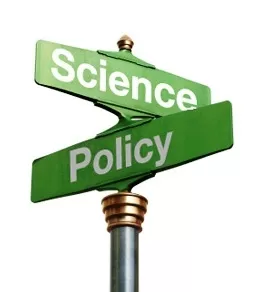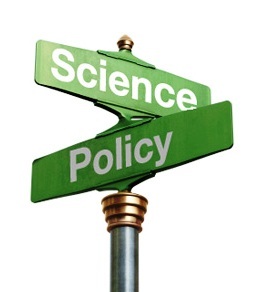
OITE’s Career Options Series will give you a snapshot overview of different career paths. The goal of this series is to help you explore a variety of different options by connecting you to new resources. A large part of making a good career decision is done by gathering information about that field. We encourage you to follow up this online research by conducting informational interviews with individuals in each field. You can check out our first career option guide on Public Health here.
What is Science Policy? Science Policy falls under two areas: Policy for Science and Science for Policy. Policy for Science looks at developing and determining STEM education and R&D funding priorities and directions as well as establishing guidelines and regulations on the practice and conduct of science. Whereas, Science for Policy looks at informing and enhancing the development, decision-making, implementation, monitoring and evaluation of policies and resulting programs and regulations.
- From the resource: AAAS S&T Policy Fellowships at http://fellowships.aaas.org/
Sample Job Titles
(Senior) Science Policy Analyst; Public Health Analyst; Director of Science Policy; Public Affairs Director; Program Officer; Health Science Policy Analyst; Public Health Analyst; Scientific Program Analyst; Science and Technology Policy Analyst; Policy Analyst Manager; Director of Public Policy and Government Affairs; Advocate, Administrator; Health Policy Advisor; Scientific Program Analyst; Policy Specialist; Government Relations Manager; Director, Research Programs Advocacy; etc.
Sample Work Settings
The majority (more than half) of these jobs are in non-profits followed by government, academia and then industry.
Sample Employers
American Institutes for Research
Department of Health and Human Services
Friends of Cancer Research
National Science Foundation
*Plus, many more! Do a “Science Policy” search on indeed.com to get a sense of employers who are hiring in this field.
Science Policy work involves:
• Assessing scientific data
• Writing briefs/memos (for internal audiences and external audiences like Congress)
• Communicating science to the general public, scientific audiences, lawmakers
• Coordinating volunteers, committee members, scientists
• Program management of seminars, coalitions, etc.
Key Skills
- Broad knowledge of science
- Knowledge of science policy
- People skills
- Communication, both written and verbal
- Analytical
- Project/Time Management
How to get started
• Fellowships e.g., AAAS Science & Technology Fellowship
• Internships e.g., science societies (generally unpaid)
• Details e.g., NIH institutes; 1 day/week
• Networking e.g., With speakers at NIH global health seminars
• Volunteering e.g., Meet-ups like DC Science Policy Happy Hour Group
• Additional education/degrees: Enroll in science and technology policy classes (GW and JHU offer a few)
Professional Organizations
American Association for the Advancement of Science
American Chemical Society – Science Policy
Network of School of Public Policy, Affairs & Administration
Additional Resources
OITE’s How To Series: Science Policy
White House Office of Science and Technology Policy Blog
Office of Science Policy at NIH
Coming up in the Career Options Series, we will be highlighting the field of Tech Transfer.
Science Policy falls under two areas: Policy for Science and Science for Policy. Policy for Science looks at developing and determining STEM education and R&D funding priorities and directions as well as establishing guidelines and regulations on the practice and conduct of science. Whereas, Science for Policy looks at informing and enhancing the development, decision-making, implementation, monitoring and evaluation of policies and resulting programs and regulations.
- From the resource: AAAS S&T Policy Fellowships at http://fellowships.aaas.org/
Sample Job Titles
(Senior) Science Policy Analyst; Public Health Analyst; Director of Science Policy; Public Affairs Director; Program Officer; Health Science Policy Analyst; Public Health Analyst; Scientific Program Analyst; Science and Technology Policy Analyst; Policy Analyst Manager; Director of Public Policy and Government Affairs; Advocate, Administrator; Health Policy Advisor; Scientific Program Analyst; Policy Specialist; Government Relations Manager; Director, Research Programs Advocacy; etc.
Sample Work Settings
The majority (more than half) of these jobs are in non-profits followed by government, academia and then industry.
Sample Employers
American Institutes for Research
Department of Health and Human Services
Friends of Cancer Research
National Science Foundation
*Plus, many more! Do a “Science Policy” search on indeed.com to get a sense of employers who are hiring in this field.
Science Policy work involves:
• Assessing scientific data
• Writing briefs/memos (for internal audiences and external audiences like Congress)
• Communicating science to the general public, scientific audiences, lawmakers
• Coordinating volunteers, committee members, scientists
• Program management of seminars, coalitions, etc.
Key Skills
- Broad knowledge of science
- Knowledge of science policy
- People skills
- Communication, both written and verbal
- Analytical
- Project/Time Management
How to get started
• Fellowships e.g., AAAS Science & Technology Fellowship
• Internships e.g., science societies (generally unpaid)
• Details e.g., NIH institutes; 1 day/week
• Networking e.g., With speakers at NIH global health seminars
• Volunteering e.g., Meet-ups like DC Science Policy Happy Hour Group
• Additional education/degrees: Enroll in science and technology policy classes (GW and JHU offer a few)
Professional Organizations
American Association for the Advancement of Science
American Chemical Society – Science Policy
Network of School of Public Policy, Affairs & Administration
Additional Resources
OITE’s How To Series: Science Policy
White House Office of Science and Technology Policy Blog
Office of Science Policy at NIH
Coming up in the Career Options Series, we will be highlighting the field of Tech Transfer.
What is Science Policy?
 Science Policy falls under two areas: Policy for Science and Science for Policy. Policy for Science looks at developing and determining STEM education and R&D funding priorities and directions as well as establishing guidelines and regulations on the practice and conduct of science. Whereas, Science for Policy looks at informing and enhancing the development, decision-making, implementation, monitoring and evaluation of policies and resulting programs and regulations.
- From the resource: AAAS S&T Policy Fellowships at http://fellowships.aaas.org/
Sample Job Titles
(Senior) Science Policy Analyst; Public Health Analyst; Director of Science Policy; Public Affairs Director; Program Officer; Health Science Policy Analyst; Public Health Analyst; Scientific Program Analyst; Science and Technology Policy Analyst; Policy Analyst Manager; Director of Public Policy and Government Affairs; Advocate, Administrator; Health Policy Advisor; Scientific Program Analyst; Policy Specialist; Government Relations Manager; Director, Research Programs Advocacy; etc.
Sample Work Settings
The majority (more than half) of these jobs are in non-profits followed by government, academia and then industry.
Sample Employers
American Institutes for Research
Department of Health and Human Services
Friends of Cancer Research
National Science Foundation
*Plus, many more! Do a “Science Policy” search on indeed.com to get a sense of employers who are hiring in this field.
Science Policy work involves:
• Assessing scientific data
• Writing briefs/memos (for internal audiences and external audiences like Congress)
• Communicating science to the general public, scientific audiences, lawmakers
• Coordinating volunteers, committee members, scientists
• Program management of seminars, coalitions, etc.
Key Skills
- Broad knowledge of science
- Knowledge of science policy
- People skills
- Communication, both written and verbal
- Analytical
- Project/Time Management
How to get started
• Fellowships e.g., AAAS Science & Technology Fellowship
• Internships e.g., science societies (generally unpaid)
• Details e.g., NIH institutes; 1 day/week
• Networking e.g., With speakers at NIH global health seminars
• Volunteering e.g., Meet-ups like DC Science Policy Happy Hour Group
• Additional education/degrees: Enroll in science and technology policy classes (GW and JHU offer a few)
Professional Organizations
American Association for the Advancement of Science
American Chemical Society – Science Policy
Network of School of Public Policy, Affairs & Administration
Additional Resources
OITE’s How To Series: Science Policy
White House Office of Science and Technology Policy Blog
Office of Science Policy at NIH
Coming up in the Career Options Series, we will be highlighting the field of Tech Transfer.
Science Policy falls under two areas: Policy for Science and Science for Policy. Policy for Science looks at developing and determining STEM education and R&D funding priorities and directions as well as establishing guidelines and regulations on the practice and conduct of science. Whereas, Science for Policy looks at informing and enhancing the development, decision-making, implementation, monitoring and evaluation of policies and resulting programs and regulations.
- From the resource: AAAS S&T Policy Fellowships at http://fellowships.aaas.org/
Sample Job Titles
(Senior) Science Policy Analyst; Public Health Analyst; Director of Science Policy; Public Affairs Director; Program Officer; Health Science Policy Analyst; Public Health Analyst; Scientific Program Analyst; Science and Technology Policy Analyst; Policy Analyst Manager; Director of Public Policy and Government Affairs; Advocate, Administrator; Health Policy Advisor; Scientific Program Analyst; Policy Specialist; Government Relations Manager; Director, Research Programs Advocacy; etc.
Sample Work Settings
The majority (more than half) of these jobs are in non-profits followed by government, academia and then industry.
Sample Employers
American Institutes for Research
Department of Health and Human Services
Friends of Cancer Research
National Science Foundation
*Plus, many more! Do a “Science Policy” search on indeed.com to get a sense of employers who are hiring in this field.
Science Policy work involves:
• Assessing scientific data
• Writing briefs/memos (for internal audiences and external audiences like Congress)
• Communicating science to the general public, scientific audiences, lawmakers
• Coordinating volunteers, committee members, scientists
• Program management of seminars, coalitions, etc.
Key Skills
- Broad knowledge of science
- Knowledge of science policy
- People skills
- Communication, both written and verbal
- Analytical
- Project/Time Management
How to get started
• Fellowships e.g., AAAS Science & Technology Fellowship
• Internships e.g., science societies (generally unpaid)
• Details e.g., NIH institutes; 1 day/week
• Networking e.g., With speakers at NIH global health seminars
• Volunteering e.g., Meet-ups like DC Science Policy Happy Hour Group
• Additional education/degrees: Enroll in science and technology policy classes (GW and JHU offer a few)
Professional Organizations
American Association for the Advancement of Science
American Chemical Society – Science Policy
Network of School of Public Policy, Affairs & Administration
Additional Resources
OITE’s How To Series: Science Policy
White House Office of Science and Technology Policy Blog
Office of Science Policy at NIH
Coming up in the Career Options Series, we will be highlighting the field of Tech Transfer.



